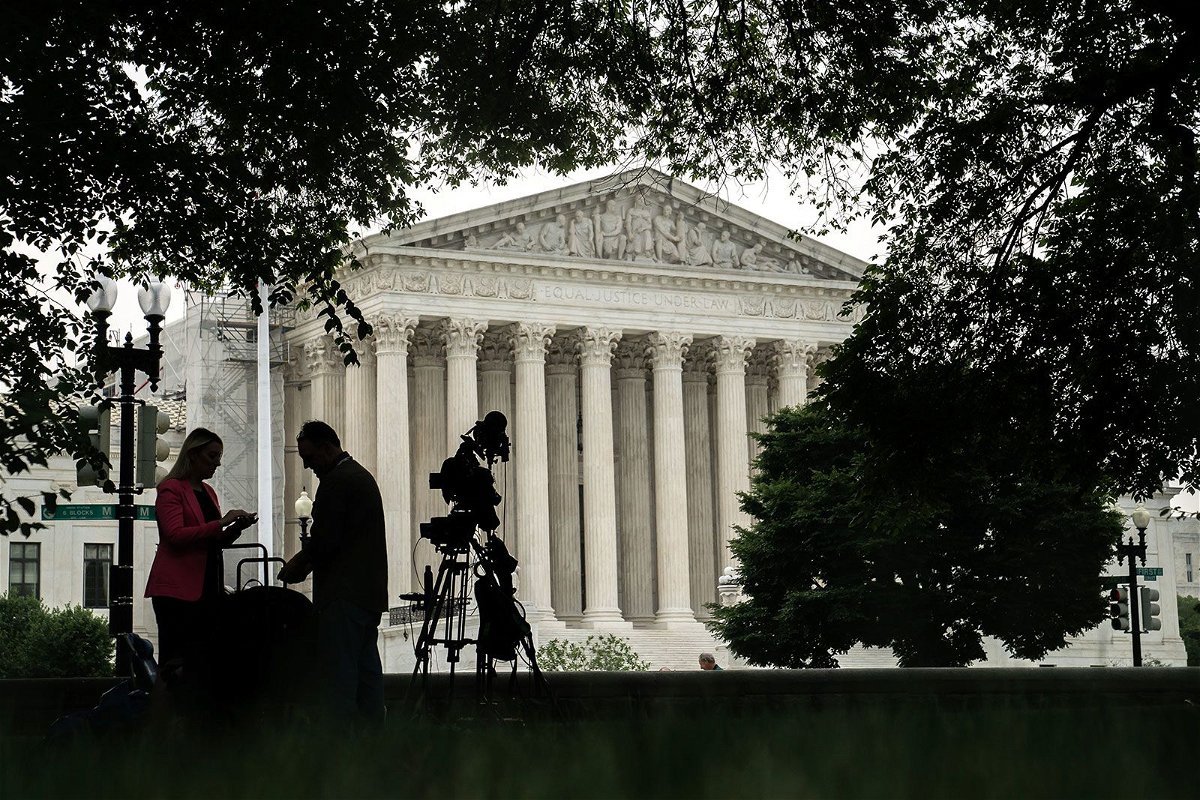Supreme Court says Florida can’t enforce anti-drag law

Cameras set up outside the US Supreme Court in Washington
By Ariane de Vogue and Devan Cole, CNN
(CNN) — The Florida law that limits drag shows in the state will remain blocked, the Supreme Court said Thursday, dealing a blow to a key initiative championed by Republican Gov. Ron DeSantis.
Florida had asked the high court to narrow a lower court’s injunction that stopped the law from being enforced statewide. The justices declined to do so.
Conservative Justices Clarence Thomas, Samuel Alito and Neil Gorsuch said they would have allowed the law to take effect.
In a brief statement agreeing with the court’s decision, Justices Brett Kavanaugh, joined in part by Justice Amy Coney Barrett, addressed the First Amendment complexities of the case and said the case was an “imperfect vehicle” for deciding some of the questions at the center of the dispute.
Florida Attorney General Ashley Moody argued that the law – dubbed the “Protection of Children Act” – was designed to “prevent the exposure of children to sexually explicit live performances.”
The 2023 law makes it a misdemeanor to knowingly admit a child to a sexually explicit adult live performance that would be obscene for the “the age of the child present.”
A district court judge in Florida blocked the law in June, holding it likely violated the Constitution’s free speech and due process protections and that it was unconstitutionally vague. The 11th US Circuit Court of Appeals declined Florida’s emergency application for a stay of the district court’s injunction, triggering the state’s ask to the Supreme Court for relief.
The high court’s order Thursday means that state officials cannot enforce the law at all before the legal challenge to it is resolved. The case could reach the justices again, but it will likely be months before the lower courts finish their review of the law and any accompanying appeals.
“While we are disappointed in this particular ruling, the Supreme Court did not opine on the merits of our law protecting children from sexualized adult live performances,” DeSantis press secretary Jeremy Redfern said in a statement. “This case is still pending appeal at the 11th Circuit, and we expect this law to be upheld on the merits.”
The law was originally challenged by a popular Orlando restaurant – Hamburger Mary’s – that hosts drag brunches and claimed that the new legislation resulted in a loss of business.
Florida had asked the justices to slightly narrow the state-wide injunction so that the law could be enforced against every business except the restaurant that was challenging it.
“Florida is now unable to enforce its statue at all, to the detriment of Florida’s children and the State’s sovereign prerogative to protect them from harm,” Moody argued.
Moody additionally said that Hamburger Mary’s is not impacted by the law because its shows are not sexually explicit.
Brice Timmons, an attorney representing the restaurant, applauded the high court’s decision Thursday.
“At this point in time, it is blocked from enforcement because all speech restrictions are presumed unconstitutional,” Timmons said in a statement to CNN. “Florida has not shown why this carve out for the LGBTQ community is special.”
DeSantis priority
The law was a priority for DeSantis, who is running for the 2024 Republican presidential nomination.
The governor, upon signing the law in May, said that the state “is proud to lead the way in standing up for our children.”
“As the world goes mad, Florida represents a refuge of sanity and a citadel of normalcy,” he said in a statement at the time.
A lawyer for Hamburger Mary’s told the high court that prior to the passage of the law, none of its drag show performances – consisting of comedy sketches and dancing – were age restricted.
After the law went into effect, the restaurant placed age restrictions on all of its performances except for a single Sunday afternoon performance tailored to the youngest possible audience in order to avoid running afoul of the law.
Since the district court temporarily blocked enforcement of the law, the restaurant has returned to normal operations. Its lawyer argued that if the court were to “silence every other party in the marketplace of ideas” it would “inherently limit” the restaurant’s free speech rights.
The challenge to the law continues at lower courts, and Steve Vladeck, CNN Supreme Court analyst and professor at the University of Texas School of Law, cautioned against drawing broader implications from Thursday’s order.
“Given the focus on procedural issues in the separate statement from Justices Kavanaugh and Barrett, it’s hard to read any broader implications for anti-drag laws out of the Court’s refusal to un-block Florida’s,” Vladeck said.
“The only thing that seems clear is that three justices are already sympathetic to such laws. Whether there are two more votes to uphold them very much remains to be seen,” he added.
This story has been updated with additional information.
CNN’s Steve Contorno and Carlos Suarez contributed to this report.
The-CNN-Wire
™ & © 2023 Cable News Network, Inc., a Warner Bros. Discovery Company. All rights reserved.